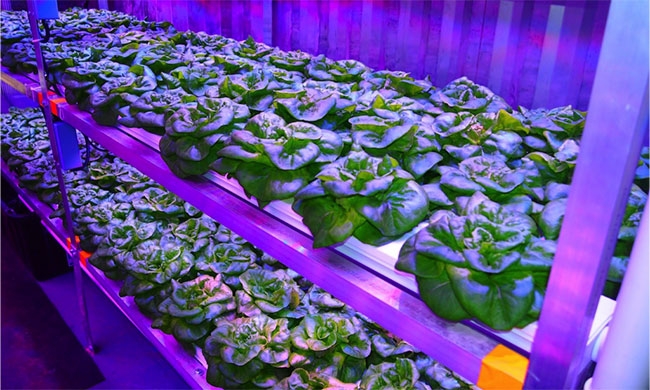
News
Technical Issues – Growing in remote regions
The Growcer brings year-round food production to hard-to-feed places.
January 22, 2018 By Lisa Mclean
 The Growcer offers plug-and-play hydroponic systems that allow entrpreneurs to grow commercial vegetables, even when it’s -50 C outside.
The Growcer offers plug-and-play hydroponic systems that allow entrpreneurs to grow commercial vegetables, even when it’s -50 C outside. If you’ve visited or lived in a remote community in Canada, chances are you weren’t there for the salad. In many regions that are far from traditional food production systems, fresh vegetables are inconsistent and costly due to the distance and effort required to get them there.
Now, an Ottawa-based company with a focus on food access is helping remote communities grow fresh vegetables 365 days a year, thanks to containerized growing systems. Corey Ellis, chief executive officer and co-founder of The Growcer, says the company offers plug-and-play hydroponic systems that allow local entrepreneurs to grow vegetables commercially, even when outside temperatures are -50 C.
“We knew that any food production system we developed for the arctic and remote regions would need to be easily dropped into communities that lack road access, and it would have to be ready to use, without relying on skilled tradespeople,” Ellis says.
Thanks to a partnership with U.S.-based Vertical Harvest Hydroponics, The Growcer provides shipping containers set up with vertical hydroponics growing systems. Each system has the capacity to produce approximately 12,000 pounds of fresh produce – that’s enough for five servings of vegetables for 100 people per day. And the systems are designed to be modular: Operators can grow their business incrementally, reinvesting profits as demand is generated.
Systems don’t need to run at full production, and because product is delivered locally, operators can harvest product as need arises. But Ellis says most operators report local interest in fresh produce is on the rise in their communities.
“In one community without road access, the customer had the system flown in, and now they can’t keep product on the shelf,” Ellis says. “It grows, it’s harvested and it flies off the shelf in the local grocery store.”
As a social enterprise, The Growcer team has a strong interest in bringing value to the communities it serves. Team members write a business plan with operators, they do a full market assessment to help them understand what people are eating, and they work with them to determine what they might grow at different price points.
The Growcer team members also travel to communities to provide training. To date, the company has established projects in a variety of regions, from Churchill, Manitoba, to Iqaluit, Nunavut.
“We’re not trying to replace traditional diets with produce, but we are interested in looking at how we can enhance them, to make those diets well-rounded and replace unhealthy store-bought foods,” Ellis says.
For example, bok choy is known to pair well with iron-rich foods. In some Northern regions the vegetable has been readily accepted as a valuable addition to traditional dishes such as caribou stew.
QUICKER RESPONSE TO FOOD ISSUES
“The people who are making decisions about what they should be growing are in the community, and that allows for a quicker and better response to each community’s food issues,” Ellis says. “And it allows the money to stay in the community – the real meaning of economic development, at the community level.”
He says The Growcer continues to measure and make decisions based on social and community development. The company was founded while Ellis and his co-founder Alida Burke were students working on a project in Nunavut, with the help of Startup Garage, a business incubator program at the University of Ottawa where Ellis will soon graduate.
As businesses continue to grow, he sees opportunities for individual communities to expand operations, and provide more value-added products and local employment opportunities through food processing, all led by local entrepreneurs.
This feature was originally published on the AgINNOVATION website. Reprinted with permission.
Print this page